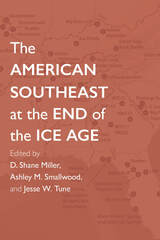16 start with O start with O
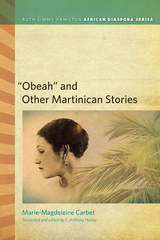
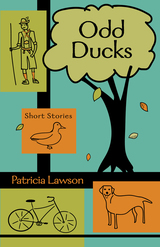
This debut collection of nine humorous stories, set in and around Kansas City from the 1950s to the 2000s, often depicts adults awkwardly mentoring talented young people, whether in a community garden, a library, or in one-on-one advice. Other characters feel like outsiders in their own neighborhoods or suddenly become outsiders when straying into unfamiliar places.
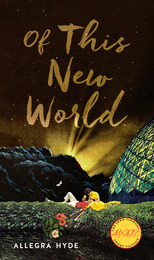
Over the course of twelve stories, Hyde writes with a mix of lyricism, humor, and masterful detail. A group of environmental missionaries seeks to start an ideal eco-society on an island in The Bahamas, only to unwittingly tyrannize the local inhabitants. The neglected daughter of a floundering hippie commune must adjust to conventional life with her un-groovy grandmother. Haunted by her years at a collegiate idyll, a young woman eulogizes a friendship. After indenturing his only son to the Shakers, an antebellum vegan turns to Louisa May Alcott’s famous family for help. And in the final story, a former drug addict chases a second chance at life in a government-sponsored space population program. An unmissable debut, the collection charts the worlds born in our dreams and bred in hope.
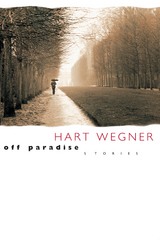
In stories that range from the Nevada desert to the lost world of prewar Silesia, Wegner explores, through the perspectives of Martin, his aging parents, and their small circle of fellow emigres, the intricate tapestry of the exile experience--childhood recollections of the vast and fertile plains of East Germany and the shelter of comfortable and loving homes, memories of the horrors of war, the guilt and terror and despair of displacement, the frustrations of finding one's way in a new and alien culture, the precious ties of family and longtime friendship. And most of all, loss--the loss of home; of an identity formed by an ancient language, the details of a shared culture, and a common sense of past and of future; of loved ones; and finally, and most tragically, of memory itself.
Wegner's characters are vividly and bravely human, bitter, tender, despairing, and full of hope. And ever-seeking a new home, a new place in which to belong after their long sojourn in the wilderness. The inner world of the exile has never been examined with such sympathy, such clarity, or such eloquence.

An unhappily married woman is impregnated by her elderly neighbor who lives in a building across the street and with whom she has never had any physical contact. Just as his attention creates life within her, his own life waxes and wanes with her gaze and attention.
A man finds himself trapped in a pub on a sweltering afternoon after refusing to buy a beer with his cigarettes. Guarded by a vigilante bartender and his beer-obsessed patrons, his every attempt at escape is foiled until their life-giving elixir, the beer, runs out.
This collection introduces English-language readers to the work of Dušan Mitana, a cult figure in contemporary Central European literature. In Mitana’s stories, appearing in English for the first time, the rational and the irrational are indistinguishable. His tales infect a banal, quotidian realism with mystical and supernatural distortions. Tinged with Hitchcockian paranoia and full of unexpected turns, the seventeen stories collected here offer a glimpse into Mitana’s trademark absurdist style.
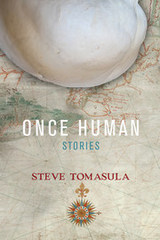
A manga artist who is afraid that she herself is slipping into a cartoon version of life, a lab technician who makes art with the cloning technology she uses at work, a sociologist hunting for the gene that makes some people want to take risks—these are some of the characters that populate the stories in Once Human. Exploring the spaces where life is shaped by science and the technologies we bring into being, Steve Tomasula’s characters often find that the harder they look at the world, the less they can say. The map that emerges from these stories charts the territory of human longing and the failure of poetry, science, and technology to explain the “why” of the world, if not its “how.”

In this award-winning debut collection, Molly McNett couples laugh-out-loud dialogue and wry observation reminiscent of Flannery O’Connor with disquieting strains of dashed hope, troubled sexuality, and disillusionment.
The adults in these stories can seem as hapless and helpless as the younger characters. Two neglected daughters use the language of clothes to cope with their parents’ divorce and their father’s mail-order bride. A young girl’s bizarre sexual fantasies help her gain control over the chaos of her family life. A gang of teenagers accuse a farmer of bestiality. A divorced father tries to create a pony-filled world that might appeal to his daughters. In the title story, Mr. Bob, the minister’s housesitter, loses a dog but finds someone to believe in. And in “Helping,” the darkest story in this amazing collection, Ruthie’s anger conquers her religious faith when she takes care of a severely disabled child.
We meet McNett’s endearing, often foolish characters at a point when their minds are open to manipulation by the people and events around them, and the conclusions they draw are heartbreaking: I am not allowed weakness; life treats people unequally; perhaps there is no God. Yet throughout they find quiet moments of possibility, courage, and a return to faith and comfort.
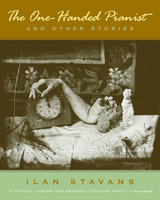
The One-Handed Pianist was published to acclaim in the early 1990’s, with the two-part Spanish edition winning the Latino Literature Prize in 1989 and the Gamma Literature Prize in 1992. Its tales look at what it means to be Jewish in the Hispanic world—a world in which spirituality is often exercised outside the realm of orthodoxy.
Stavans constructs fables that raise questions about ethnicity and community; even Stavans’ person raises questions about ethnicity and community: what does it mean that a Jew of Eastern European lineage can call himself Latino and speak for that group?
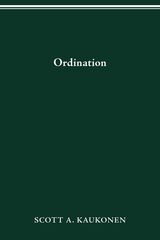
“If my mother were to tell the story . . .” So begins the title piece in this debut collection of short fiction, eight stories that explore the gap between the stories we tell ourselves and the stories we have lived. In “Punitive Damages,” a father, the beneficiary of a huge financial settlement in compensation for his son’s death, must confront the truth of the life that the son’s death has provided. In “Punnett’s Squares,” winner of the Chicago Tribune’s Nelson Algren Award, an adopted son seeks to prove, against all evidence to the contrary, that his adoptive father is in fact his biological father. In “Induction Ceremony,” a small-town basketball hero returns to his hometown no longer a man but now a woman, and his onetime teammate-and-friend must reconsider who they were and who they are now. In the pair of pieces that bookend the collection, “Ordination” and “Be a Missionary,” a Baptist preacher’s son must reconcile the distance between the evidence of things seen and the evidence of things unseen.
These are men and boys who like to see themselves as worthy of the titles of father, son, husband, lover, and friend, but who must fight their own instincts and desires to claim such honors. These are boys and men for whom questions of identity—biological, cultural, sexual, religious, moral—are unavoidable, men and boys always seeking to be who they want to be, always aware of who they are.
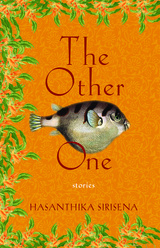
An excerpt from the book:
"All I want to know is when you are coming? When are you bringing my sons, my family?"
She watched as a gecko, tinier than normal, skittered across the far wall. It disappeared into a small crack. The room was very hot, and she hadn't turned on the ceiling fan so that the family could save a little money. She took a handkerchief from her nightstand and wiped the beads of sweat from her forehead and the back of her neck.
"I can't leave malli alone here. He's making progress but—"
"It will be for two years only. Then you can sponsor him."
"The lawyer says it's not so easy."
"He's a grown man. Let the government take him. The government did this to malli. Let the government pay the price for his care."
Even though there was no chance that her brother Ranjith could hear her, Anoja dropped her voice. "Malli is all alone here. He has nobody but aiya and me."
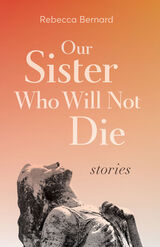
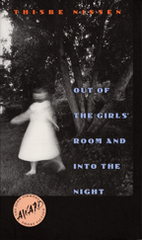
Out of the Girls' Room and into the Night is a spirited, offbeat collection of stories, elongated riffs on that thing we call …love. All manner of love stories: thwarted love stories, imaginary love stories, love stories offhand and obsessive, philosophical love stories, erudite and amusing love stories.
“People don't meet because they both like Burmese food,” says one character, “or because someone's sister has a friend who's single and new in town, or because Billy's nose happened to crook just slightly to the left at an angle that made me want to weep…People don't fall in love with each other …they just fall into love.”
Everyone does it: women of fierce independence, men of thin character, rambling Deadheads, gay teenage girls, despondent Peace Corps volunteers, anorexic Broadway theatre dancers, the eager, the grieving, the uncommunicative. Even the confused do it. And they don't just fall in love with each other—they fall in love with certain moments and familiar places, with things as ephemeral as gestures and as evanescent as sunlight.
Quirky, real, idealistic, deluded, bohemian, and true, these are people who can—and often do—fall in love with a pair of ears, August afternoons, saucers of vitamins, New Age carpenters, and dead bumblebees. And if there's something they can teach us, it's how to conceive of alternative worlds and the terror and the exhilaration of venturing outside the confines of the lives we know and making our way into a dark, glittering unknown.
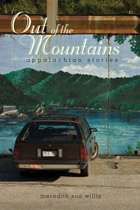
Meredith Sue Willis’s Out of the Mountains is a collection of thirteen short stories set in contemporary Appalachia. Firmly grounded in place, the stories voyage out into the conflicting cultural identities that native Appalachians experience as they balance mainstream and mountain identities.
Willis’s stories explore the complex negotiations between longtime natives of the region and its newcomers and the rifts that develop within families over current issues such as mountaintop removal and homophobia. Always, however, the situations depicted in these stories are explored in the service of a deeper understanding of the people involved, and of the place. This is not the mythic version of Appalachia, but the Appalachia of the twenty-first century.

These stories are often set against large, significant events like the Cold War, Vietnam, and the Kent State shootings, but are always uniquely local. A mother fends off the police by brandishing copperhead snakes. A woman cares for the dog of an alleged double murderer. A husband who has lost his job works at trying to save his wife from a debilitating phobia.
This extensive collection by Gary Fincke, an accomplished poet and writer of fiction, gives rise to ordinary people living lives made fascinating by attention to the particulars of voice, place, and character. With precise language, surprising imagery, and sharp, evocative dialogue, these stories deepen beyond the oddities of their characters, who are scarred and defeated by circumstance and choice, but also attain moments of grace, compassion, and generosity of the spirit.
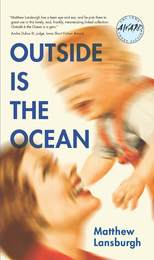
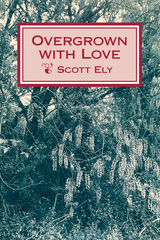
Lead short story featured in 1993 Best American Short Stories
A wide variety of characters saunter, stalk, run, and sometimes hide in these lively stories about contemporary Southerners. Their experiences revolve around the way life is felt and the way it is lived, reflecting a gap between the plans we make for ourselves and the way things actually turn out. From the jungles of Vietnam to the bayous of Louisiana, from the French countryside to Vicksburg, Mississippi, Ely’s stories reveal how human beings’ unpredictable, unconscious motivations will have their say no matter what steps are taken to silence them.
Certain shadows fall over all the characters—especially the shadows of the Vietnam experience and the struggle between a traditional Southern heritage and the conflicting ideals of contemporary society. The characters in Ely’s stories seem powerless to defend themselves against the ever-changing expectations of a modern life, and yet they gain a new humanity and depth when, with dignity, they embrace their limitations.
READERS
Browse our collection.
PUBLISHERS
See BiblioVault's publisher services.
STUDENT SERVICES
Files for college accessibility offices.
UChicago Accessibility Resources
home | accessibility | search | about | contact us
BiblioVault ® 2001 - 2024
The University of Chicago Press





